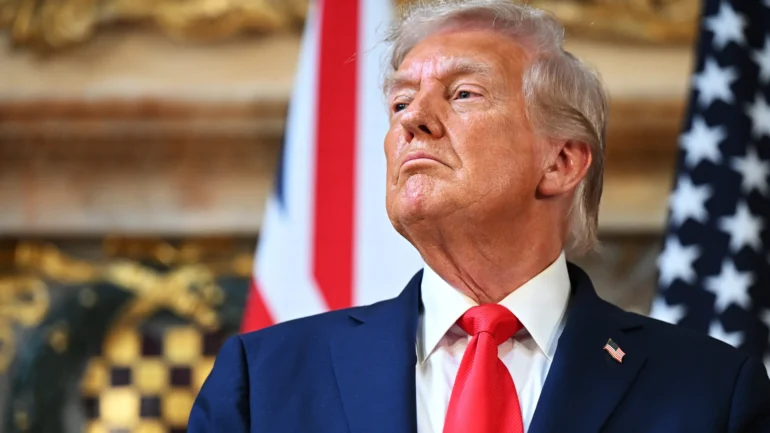On September 23, 2025, President Donald Trump delivered a major speech at the United Nations General Assembly in New York, marking his first address to the annual gathering since returning to office. The White House described the speech as a platform for Trump to highlight the “renewal of American strength” and present his vision for a changing world order, one that challenges the influence of global institutions like the UN itself.
A Focus on American Strength and Global Challenges
According to White House press secretary Karoline Leavitt, Trump emphasized the decline of “globalist institutions” and their role in weakening the world order. He outlined a straightforward approach to global issues, focusing on migration, trade, and conflict resolution through direct diplomacy. Trump also touted his administration’s achievements, claiming to have ended seven global conflicts in just eight months, including brokering peace between Armenia and Azerbaijan. However, his efforts in resolving ongoing wars in Gaza and Ukraine have yet to yield significant progress.
The speech came at a time when the UN General Assembly was dominated by discussions on Israel’s war against Hamas in Gaza and the Russia-Ukraine conflict. Trump’s remarks reflected his skepticism of multilateral diplomacy, favoring instead personal relationships with world leaders to address global challenges. He criticized the UN’s effectiveness, aligning with his administration’s broader moves to reduce U.S. funding for the organization, including withdrawing from the UN Human Rights Council, UNESCO, and the World Health Organization.
Gaza and Palestinian Statehood: A Divisive Issue
The question of Palestinian statehood was a major focus at the UN this week, with over 150 of the 193 UN member states supporting a conference co-hosted by France and Saudi Arabia to discuss a two-state solution. French President Emmanuel Macron announced France’s recognition of a Palestinian state, declaring, “The time for peace has come.” Palestinian President Mahmoud Abbas, speaking virtually after the Trump administration revoked his U.S. visa, condemned Hamas’s actions on October 7, 2023, and called for a permanent ceasefire and cooperation with Trump on a peace plan.
Trump, however, remains opposed to recognizing Palestinian statehood, arguing it would “reward” Hamas and fail to secure the release of hostages or end the Gaza conflict. “He believes these decisions are just more talk and not enough action from some of our friends and allies,” Leavitt said. Trump’s multilateral meeting with leaders from Qatar, Saudi Arabia, Indonesia, Turkey, Pakistan, Egypt, the United Arab Emirates, and Jordan underscored his intent to address the Gaza crisis through direct negotiations, though his administration continues to face pressure to push Israel toward ending the fighting.
Russia-Ukraine War: Calls for Pressure and Frustration with Putin
The Russia-Ukraine war also took center stage, with Ukrainian President Volodymyr Zelenskyy urging UN leaders to apply “strong political pressure” on Russia to restore international law. Trump, who met with Zelenskyy on the sidelines of the General Assembly, expressed frustration with Russian President Vladimir Putin, stating, “He’s let me down.” Despite claiming a strong relationship with Putin, Trump noted that their recent summit in Alaska produced no breakthroughs. He suggested that reducing global demand for Russian oil could force Russia to negotiate, but he has resisted imposing stronger sanctions while other nations continue purchasing Russian energy.
A Changed Reception at the UN
Trump’s return to the UN stage was a stark contrast to his first term, when his 2018 speech drew laughter from delegates after he boasted about his administration’s accomplishments. Seven years later, world leaders are approaching Trump with flattery and strategic overtures, recognizing his influence in a shifting global landscape. His policies, including slashing U.S. contributions to the UN budget and humanitarian aid, have left the organization financially strained, reinforcing his view that the UN has not lived up to its potential.
On Tuesday, Trump also held bilateral meetings with UN Secretary-General António Guterres, European Commission President Ursula von der Leyen, and Argentinian President Javier Milei, alongside his multilateral talks with Muslim-majority nations. These discussions highlighted his preference for direct diplomacy over the UN’s traditional multilateral framework.
Looking Ahead
Trump’s speech and actions at the UN General Assembly underscored his intent to reshape global engagement, prioritizing American interests and personal diplomacy over institutional cooperation. While he has claimed successes in resolving some conflicts, the ongoing wars in Gaza and Ukraine remain significant challenges. As Trump continues to navigate these issues, his approach—marked by skepticism of global institutions and a focus on bilateral relationships—signals a broader transformation in how the U.S. engages with the world.
